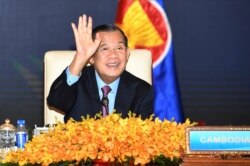More than four months after the U.S. House passed the Cambodia Democracy Act, a bill that would place stiff sanctions on Cambodian leaders for alleged human rights abuses, there was no public sign of action on the Senate’s version of the bill.
However, key House proponents of the bill say they trust Sen. Ed Markey (D-Mass), a member of the Senate Foreign Relations Committee who represents the large Cambodian community in Lowell, will get the legislation to President Joe Biden’s desk.
“I am very confident that my friend, Senator Markey, who introduced the bill in the Senate, in partnership with Senators Rubio, Durbin, Tillis and Feinstein, will be able to secure final passage of the bill,” said Rep. Alan Lowenthal Representatives (D-Cal.), who represents the largest Cambodian community in the U.S.
Lowenthal announced last month he will not run for another term. Markey’s office did not respond to multiple requests for comment from VOA Khmer on the status of the Cambodia Democracy Act, nor did his Senate co-sponsors — Sens. Marco Rubio (R-Fla.), Thom Tillis (R-N.C.), Dianne Feinstein (D-Calif.) and Dick Durbin (D-Ill.).
If the bill is passed by the Senate and signed by the president, it would place sanctions on Cambodian military officials, security forces, and senior members of the ruling Cambodian People’s Party, who the president deems responsible for human rights violations in the country.
“The Cambodian people deserve what was promised to them in the 1991 Paris Peace Agreements – a representative democracy that reflects the popular will, not oppressive single party rule,” Markey said in a statement when he introduced the Cambodia Democracy and Human Rights Act in August 2021, before the House passed its version.
“This legislation makes clear that the United States will not stand by, as Hun Sen and his cronies corrupt Cambodian democracy, persecute and jail opposition and political activists, target free speech and independent media, and enrich themselves through rampant corruption,” he added.
Rep. Lori Trahan (D-Mass), whose district includes Lowell, told VOA Khmer by email that she continues to push for the bill, which is currently in the Senate Foreign Relations Committee.
“I’m working with my colleague Senator Markey to ensure that this important legislation makes it through the Senate and gets signed into law,” she said.
“The Cambodia Democracy Act will hold Prime Minister Hun Sen and corrupt government officials responsible for their anti-democratic actions and human rights violations. This bill supports Cambodia’s path to a free and fair democracy, and we’re going to get it done.”
The legislation — sponsored by Lowenthal and Rep. Steve Chabot (R-Ohio), co-chairs of the congressional Cambodia caucus — passed overwhelmingly in the House in late September last year, with 403 votes to approve it and just 17 objecting.
“Since the CNRP’s dissolution, the government of Cambodia has arrested, imprisoned, or brought politically motivated charges against CNRP leaders and activists,” also noting the mass trials of opposition politicians and activists since the party was dissolved in 2017.
“The Government of Cambodia has taken several measures, particularly since 2017 and during the COVID-19 pandemic, to restrict Cambodia’s space for civil society and media environment, especially through politicized tax investigations against independent media outlets,” it stated.
The current iteration of the Cambodian Democracy Act is the third U.S. legislative effort in recent years to sanction Cambodia’s ruling party for alleged abuses and violations of democratic norms. The previous two bills also stalled in the Senate.
Prime Minister Hun Sen recently made a public statement saying he isn’t worried about the latest bill, even if he is personally barred from traveling to America.
“I wish to send messages that if the bill passes, there is only one thing, and it will never go the other way. You shut me down, that means you can’t enter as well and I can't go out. That's nothing,” he said. “It will not happen only one side at all, don't let it be too difficult."
Phay Siphan, a spokesman for the Cambodian government, said the bill only targets individuals, and U.S.-Cambodia relations would go on as normal, but added it was a geopolitical maneuver and not reflective of the situation on the ground.
“That's the rights and sovereignty of the United States, and it's politically motivated, which the allegation does not reflect and respond to the reality,” he said.
Even as the Cambodian Democracy Act appears to have stalled in the Senate, the U.S. has made waves with other actions targeting Cambodian military leaders involved with the Ream Naval Base in Preah Sihanouk province, which has become a flashpoint for tension between the U.S. and China.
On November 10, the U.S. Treasury Department and State Department announced the sanctions against General Chau Phirun, director-general of the Defense Ministry's material and technical services department, and Admiral Tea Vinh, the Royal Cambodian Navy commander and the brother of Defense Minister Tea Banh.
The U.S. agencies accused both men of personally profiting from U.S. funds meant for developing the naval base. The U.S. fears could soon come under effective Chinese control, as relations between Beijing and Phnom Penh become ever closer.
In response to those sanctions, Cambodia’s Foreign Ministry lashed out at the “long-arm jurisdiction” of the U.S., adding: "The smear campaign and unilateral sanction of the United States against public figures of a sovereign state... [displays] an utter contempt for the independence of another country, as well as acts as a serious interference in its domestic affairs.”
Cambodian political observer Sophal Ear, an associate professor at the Thunderbird School of Global Management at Arizona State University, called the Cambodian Democracy Act “icing on the cake” in terms of U.S. commitment to holding Cambodian leaders accountable for the deterioration of democracy.
“I think this year could be the year because Democrats control the Senate. Senator Markey is a dear friend of Cambodia. Lowell Cambodians will be clamoring for his leadership on this. This is the best chance the people of Cambodia have to put their leaders on notice, thanks to the US Senate finally having the right numbers,” he said. “Whether it happens, the US cares about Cambodia and is ready to punish Cambodian officials. Global Magnitsky Human Rights Accountability will always be there. This is just icing on the cake. The US Congress and President will punish the Cambodian authorities for their misdeeds,” he added.
Mu Sochua, a vice president of the opposition Cambodia National Rescue Party (CNRP), said co-opposition leader Sam Rainsy spent a few weeks in Washington D.C. last November lobbying for U.S. action against Hun Sen’s regime, including virtual meetings with Markey and Chabot.
She noted that the U.S. Treasury can continue to sanction those individuals most responsible for corruption and undermining democracy. “But with this law, it will be a potential resource that can name more people, because we will see that when the bill becomes law, President Joe Biden and other presidents after can use this law broadly,” she added.







